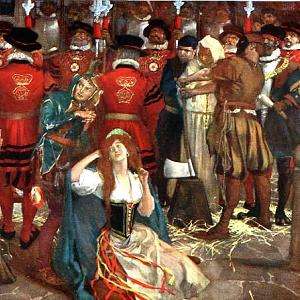The Yeomen of the Guard

The Yeomen of the Guard, or, The Merryman and his Maid is an opera by Gilbert and Sullivan. Though generally considered a "comic opera," it is notable as the team's most serious work. (Sir Henry Lytton wrote that Gilbert once told him that he had always intended Jack Point to die at the end, but had somewhat modified his intention due to the great comic reputation of George Grossmith, who originated the role.)
The central motif of the drama is said to have been suggested to Gilbert when he saw a Beefeater displayed on the advertisement of a London furniture moving company. His imagination took fire at the picturesque Tower of London setting, and he made a special study of Shakespearean language in order to create the proper feel for the period. The plot-device of the secret wedding may have been suggested by an earlier melodrama, Maritana, itself based on a still earlier French play, Don César de Bazan. However, neither of those sources have the eccentricity of character or the wit, grace, and occasional profundity of Gilbert's libretto, let alone the rich and glittering texture of Sullivan's outstanding score, "over which" (it has been said) "the motif of the Tower broods like a watchful giant."
Synopsis
In the early sixteenth century, Colonel Fairfax, framed on a charge of sorcery, is imprisoned in the Tower of London, set to be executed; his friend, Sergeant Meryll and Meryll's amorous daughter Phœbe hatch a plot to loose Fairfax and let him assume the place of Meryll's son, due to join the Yeomen of the Guard.
Meanwhile, the strolling players Jack Point and Elsie Maynard take service with the Lieutenant of the Tower; the Lieutenant, who has been asked by Fairfax to find him a woman to marry (in order to keep his property from going to the cousin who framed him), convinces Elsie (and Point, who loves her) to let a blindfolded Elsie be Fairfax's bride, since the groom will be executed immediately thereafter.) The marriage accomplished, Meryll springs his plot; Elsie and Point are horrified to find that her husband is still alive. When Fairfax learns that it is the winsome Elsie whom he has married, he resolves to woo her in the character of Leonard Meryll, and succeeds in gaining her affections, though she refuses to marry him until assured that she is free of Fairfax.
Meanwhile, Point and the oafish gaoler Wilfred Shadbolt plot to declare that Shadbolt has shot the escaped Fairfax, but that the body unfortunately sank in the river. Elsie, to the grief and shock of Point and Phœbe, agrees to marry Leonard/Fairfax; but is shocked in her turn when she learns that Fairfax has been pardoned and come to claim her; her tears turn to joy when she learns that Fairfax is Leonard -- but the opera ends on a melancholy note, as Point, seeing that Elsie is lost to him forever, "falls insensible" at her feet.
- Cut Song: "When Jealous Torments Rack My Soul" for Wilfred, "A Laughing Boy But Yesterday" for Sgt. Meryll. Modern productions may include either or both songs.
- Dark Reprise: "I Have a Song to Sing, O!"
- Darker and Edgier
- Downer Ending
- Face Death with Dignity: Fairfax
- For Doom the Bell Tolls
- Historical Domain Character: Sir Richard Cholmondeley was Lieutenant of the Tower of London from 1513 to 1524. The play is thus set early in the reign of King Henry VIII.
- Mondegreen: Anyone else hear the "love a heartless jade" line from "When Jealous Torments Rack My Soul" as "love a heartless jail"?
- Murder the Hypotenuse: Played with. Fairfax is the hypotenuse of not one but two love triangles. His rivals, Point and Wilfred, publicly claim to have killed him as he tried to swim across the Thames, reasoning that Fairfax can't contradict them without fatally blowing his cover.
- Death of the Hypotenuse: Jack Point.
- Pair the Spares: Subverted. The marriages that result do not appear happy, and Jack Point gets left out to dry.
- Patter Song: Jack Point has two of them -- "I've Jibe and Joke" and "Oh, a Private Buffoon."
- Playing Cyrano: Played with. Fairfax leads a quartet about how wooing has to be learned, with Jack Point eagerly hoping to apply this teaching to Elsie. Then Fairfax proposes to Elsie and sends Jack off.
- Rags to Royalty
- Sad Clown: Jack Point
- She's All Grown Up: Played with. When Phœbe greets Fairfax as "Leonard", he has no idea who she is. Upon learning that she's his sister, he exclaims, "Why, how you've grown! I did not recognise you!"
- Shown Their Work: The Tower of London is guarded by the Yeomen of the Guard, not the Yeomen Warders, which didn't exist until 1548.
- So Unfunny It's Funny: Jack Point's attempts to impress the Lieutenant are this.
- Talking in Your Sleep: Kate hears Elsie talking in her sleep, and learns important information from it.
- Ye Olde Butcherede Englishe: Averted, for the most part; as mentioned above, Gilbert made a special study of Elizabethan language to get it right.
- He did make one blunder, however. In "When a wooer goes a-wooing," he uses the word "mickle" to mean "little" ("'Tis but mickle sister reaps"); it actually means the exact opposite, "much, large, great."
- To be fair, "mickle" does mean "little" in Scottish dialects, which use "muckle" to mean "large". (Northern English dialects reverse the meanings.) Gilbert probably learned the Scottish definitions of the words during his many years in a Highland volunteer regiment.
- He did make one blunder, however. In "When a wooer goes a-wooing," he uses the word "mickle" to mean "little" ("'Tis but mickle sister reaps"); it actually means the exact opposite, "much, large, great."